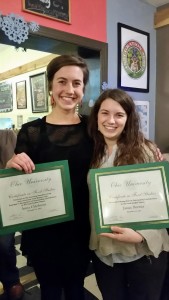By Rachel Komich ’16
Food Matters, the campus student organization focused on food, was founded by recent graduates Anna Chleboun and Janice Brewer in Spring 2014 to enhance student and community experiences with the Food Studies theme at Ohio University.
The club highlights the important role food plays in our daily lives by focusing on building knowledge of food systems, food identity and food justice while also emphasizing the aspect of food for personal enjoyment. Through opportunities such as the lectures, farm tours, community food businesses, food production facilities and restaurants, and workshops led by professors and students, Food Matters aims to bring the community and university together through the experience of food.
Chleboun graduated with a Bachelors of Specialized Studies in Psychology, Dance, Religious Studies and Food Studies. Brewer graduated with a B.S.S in Sustainable Food Systems. Both were awarded certificates from the Food Studies theme. Here is what they have to say about the experience of founding an organization, watching it grow, and passing it on.
How Did Food Matters Begin?
JANICE BREWER: It was at Donkey, I think early spring semester 2014. I was talking to one of my friends about food and working at the Atrium Cafe and trying to get involved with local food. Anna overheard me and was like, “Hey I’m the Food Studies intern and we’re trying to start a Food Matters club.” And I said, “Hey I wanna be all involved.” I was the treasurer because we needed a president and a treasurer on paper. We ended up co-presidents and started planning events and finding ways to get students connected to food with volunteer opportunities, learning more about food insecurity in Athens, and organizing a food studies speaker series and workshops.
ANNA CHLEBOUN: I was doing a Food Studies internship with Dr. Theresa Moran in the spring of 2014. My job involved disseminating the idea of food studies and making students aware not only of the theme but also the broader idea of studying food and the human experience. I wanted to see if an extracurricular community of like-minded students could be grown from the ground up. It was just a progression from there. It just started as this symbiotic relationship between Food Studies and Food Matters, offering student support and faculty support and that kind of thing for different projects or trips or workshops. The Food Matters Club has evolved from there based on what people are interested in and what people have energy and passion for.
How Has Food Matters Evolved Since It Began?
JB: Well, I remember Anna and I talking in the beginning like you know we’re just starting this thing, not sure if it’s gonna pick up, being humble and not knowing if people were going to show up. We were really happily surprised by how many students were interested in food and local food and all the aspects. Since then Food Matters has been growing in different ways especially with the club’s involvement with the Plant Biology Learning Gardens on West State. The summer How Food Works interns have been a great support system for Community Food Initiatives. CFI can reach out to us, and now there’s an outlet for them to come to us for help. Our visibility and people knowing we exist has increased a lot. Working with the Real Food Challenge, getting more and more students involved with their interest area of food.
 AC: I think interest has really grown. Now there’s lots of involvement with the PBIO gardens. It’s incredible that now Food Matters can help make organic local food accessible to community members and students. I think also we got Ohio University people acquainted with the Athens community, so that now we can focus more on practical skills and community building. I think interest in sustainable food across campus has really grown, absolutely.
AC: I think interest has really grown. Now there’s lots of involvement with the PBIO gardens. It’s incredible that now Food Matters can help make organic local food accessible to community members and students. I think also we got Ohio University people acquainted with the Athens community, so that now we can focus more on practical skills and community building. I think interest in sustainable food across campus has really grown, absolutely.
What Are Your Plans for the Future ?
JB: I will be continuing to work for Shagbark Seed and Mill, where I’m building our demo-er team across Ohio and training individuals to represent our product so that way more people have access to what real food tastes like so that we can have a bigger impact on changing the bean and grain industry into what we want it to be in the future. I’ll probably also be working with public schools and universities to incorporate our products in dining halls. I will still be volunteering with Community Food Initiatives—I’ll have more time to do that.
AC: During the the spring, I will continue to work for the Food Studies theme. I am focusing on program development and planning the Spring Break Food Justice program. In the summer, I will look for food related internships and looking for positions in local food systems in the West.
Any Last Words?
JB: I think all students should have to take sustainable agriculture, or any student that can should definitely do it. More food studies classes need to be hands-on and experimental in learning other than just reading.
AC: Food Studies is where it’s at.




















Comments